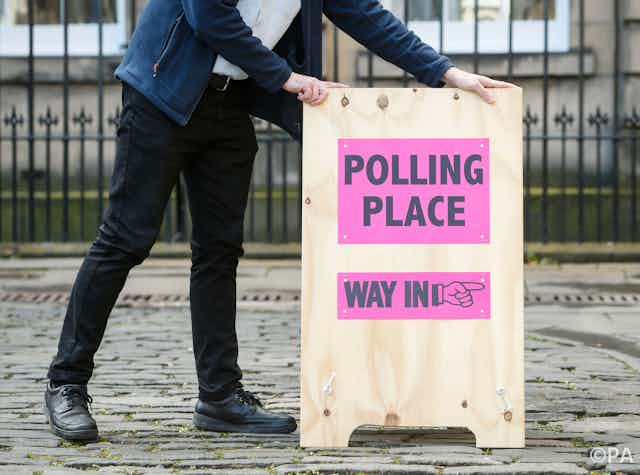Numerous polls are indicating that voters are moving towards a Brexit vote in the final weeks of the EU referendum campaign. Britain’s withdrawal from the EU is now a genuine possibility.
The campaign has largely been filtered down into two dominant themes – immigration and the economy. Whether voters take a positive or negative view of the immigration that comes hand-in-hand with membership of the EU is a crucial matter.
Recent research suggests some good news for the Remain campaign on this battle front. It seems ethnic minority voters are far more positive about immigration than white British voters.
This is perhaps surprising, since the media currently seems very keen to track down any ethnic minority voters who are opposed to immigration. This is working alongside a growing political discourse which suggests that this is the case across much of “ethnic minority Britain”.
Survey data indicates that ethnic minority voters could be a good source of votes for staying in the EU. The bad news, though, is that they really need to be encouraged to turn out to vote on June 23.
Welcoming newcomers
A study carried out for think tank Bright Blue in early 2015 showed ethnic minorities held more positive views of immigration than the rest of the British population.
Nearly three-quarters of ethnic minority respondents (72%) agreed that immigration had provided skills for the UK economy – a full 30 percentage points more than the 42% figure for the general population.
Asked whether immigration supports the NHS, 52% of ethnic minority respondents agreed, compared to only 40% of the wider population.
When asked if immigration depressed wages for British workers, 45% of ethnic minority respondents agreed. That might seem high, but it’s actually 15 percentage points lower than the 60% figure for the wider population. This is a particularly interesting finding, as ethnic minority workers are more likely to be in lower-paid occupations and menial jobs.
The report concluded that, in comparison to the wider British population, ethnic minorities have a more “welcoming outlook” and are much more positive about the impact of immigration.
Support for EU membership
What’s more, recent survey data analysis by the British Election Study suggests that Britain’s ethnic minority population could hold the key to deciding the UK’s fate on EU membership. These voters are more pro-European than white voters.
Voting intention for the EU referendum

White voters are neck and neck when it comes to deciding whether Britain should remain or leave, with 41.85% opting to remain and 41.79% wishing to leave the EU – a difference of just 0.06 percentage points.
Ethnic minorities, however, are far more supportive of continued EU membership. All the ethnic minority groups report a strong preference for remaining as opposed to leaving the EU.
There is particularly strong support for continued EU membership among the Chinese and Black African ethnic groups. British voters of Chinese origin report the highest percentage figure for remaining in the EU, with 64.51% saying they would vote in. Among voters of Black African origin, support for remaining stands at 63.09%, with outers making up just 15.61% – the largest percentage-point difference for remaining over leaving the EU across all the ethnic groups (47.48 percentage points).
The turnout problem
There is, however, a big problem for the Remain camp – ethnic minorities seem far less likely to vote in the upcoming referendum than white voters. This does come as something of a surprise, considering 2010 Ethnic Minority British Election Study survey data showed little difference between ethnic minorities and the white British population in terms of voter turnout. However, the latest British Election Study survey data suggests this is not the case when it comes to turnout intention for the EU referendum.
Turned out good?

While more than 80% of white voters say they are very likely to vote, the percentage figures for the ethnic minority groups range between just 53.41% and 61.79%.
While the two most pro-European ethnic minority groups (Chinese and Black Africans) also have the highest percentage figures out of the ethnic minority groups for this measure of turnout intention, both of their figures are roughly 19 percentage points lower than the 80.42% of white voters who reported that they are very likely to vote in the EU referendum.
This will be a concern for the Remain campaign, as white voters are considerably more Eurosceptic and in favour of leaving the EU.
Voting intention among people who are ‘very likely’ to vote

Something very telling happens when you filter survey response down to just the people who rate themselves as “very likely” to vote in the upcoming referendum. For white voters, the percentage figure for leaving now exceeds that for remaining (46.02% / 43.63%) – with the Leave figure from Table 1 increasing by over four percentage points (41.79% to 46.02%).
When turnout intention is taken into consideration, the percentage figure for Indians planning to vote Remain doesn’t change much. But, crucially, the number leaning towards Leave rockets by nearly 10 percentage points from the Table 1 figure of 27.74% to 37.68%. From a Remain perspective, that is a real cause for worry, as British Indians represent a sizeable part of the eligible electorate for the EU referendum.
Before turnout intention is taken into consideration, Remain has an overall two percentage point lead over Leave (42.79% / 40.54%). But when it is factored in, that lead disappears. Leave in fact comes out marginally ahead of Remain (45.16% / 44.46%) – a difference of 0.7 percentage points.
Ethnic minorities are less likely to be seduced by the Leave campaign’s rhetoric about immigrants flooding the labour market, driving down wages and overwhelming the NHS. But that doesn’t count for much if they don’t turn up on June 23. They are less likely to do so – and the Remain camp would be wise to take that into account in the final push for support.

